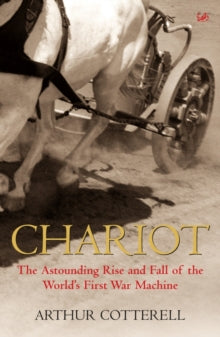By: Arthur Cotterell
The chariot changed the face of ancient warfare. First in West Asia and Egypt, then in India and China, charioteers came to dominate the battlefield. Its use as a war machine is graphically recounted in Indian epics and Chinese chronicles.
Homer's Iliad tells of the attack on Troy by Greek heroes who rode in chariots. In 326 BC Alexander the Great faced charioteers in northern India, while in 55 BC, on a Kent beach, Julius Caesar was met by British chariots. Because of the danger involved, chariot racing attracted hundreds of thousands of spectators.
So enthusiastic were they that the Roman emperor Nero could not resist driving his own ten-horse chariot at the Olympic Games: he fell out but still won the prize. Rivalry between groups of spectators at chariot races often ignited urban riots. In Constantinople, in 532 AD, a three-day disturbance left 30,000 dead.

